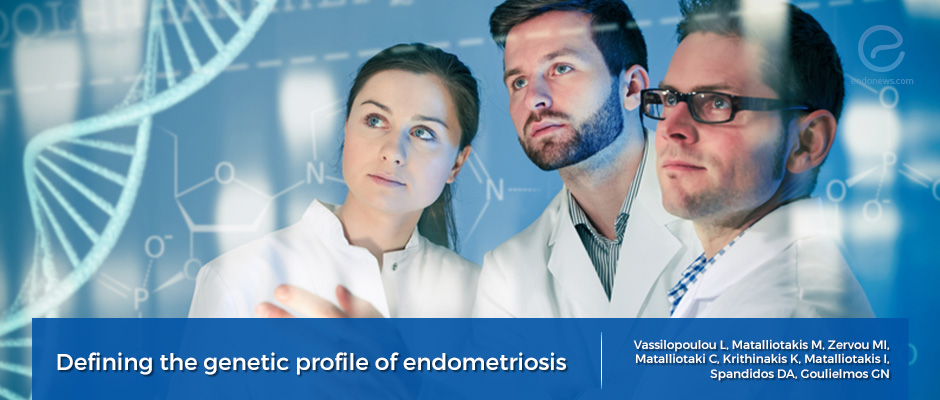Endometriosis pathophysiology: research in genes updated
Jun 17, 2019
What are the promising genetic research methods in endometriosis ?
Key Points
Highlight:
- Vassilopoulou et al., present current knowledge about gene‑gene and gene‑environment interactions involved in endometriosis
- They also discuss the effectiveness of genome‑wide association studies (GWAS) in identifying potential therapeutic targets for better management and treatment.
Background:
- Endometriosis is an estrogen‑dependent disease, defined by the development of endometrial tissue in ectopic sites.
- The multifactorial nature of endometriosis involves the participation of immune mechanisms, angiogenetic processes, biochemical alterations, genetic factors, as well as epigenetic modifications act together for disease manifestation.
Key points:
- Family studies in endometriosis patients aim at defining inheritance trends and linkage analysis studies focus on the identification of genetic sites related to the pathology.
- Genetic association studies take into account possible genes and single nucleotide polymorphisms and thus target at revealing the association between severity of disease and genetic variations.
Conclusions:
- The pathogenesis of endometriosis involves both genetic and environmental factors.
- Familial studies, linkage analysis, genetic association studies and genome‑wide association studies (GWAS) have widened our understanding of the pathophysiology of endometriosis through ample evidence associating cellular procedures.
- However, many aspects of the disease etiology remain obscure.
- Whole exome sequencing (WES) allowing the analysis of all exonic regions of a genome by next‑generation sequencing (NGS) is promising.
- A weakness of the new technological approaches of WES and whole genome sequencing (WGS), is that they operate for identification of genetic factors involved mainly in monogenic diseases.
- Studies encompassing genomics, cellular biology, and clinical research would enhance the so that conveying this knowledge in clinical practice could be possible.
Lay Summary
Endometriosis has a broad spectrum of environmental influences and genetic factors. I
In this recently published review article in Experimental and Therapeutic Medicine, Vassilopoulou and associates present information about gene‑gene and gene‑environment interactions involved in endometriosis and discuss the effectiveness of GWAS in identifying novel potential therapeutic targets.
Familial studies defined inheritance trends, linkage analysis studies revealed the identification of genetic sites related to disease vulnerability. Genetic association studies involve candidate genes and single nucleotide polymorphisms, and at unraveling the association between severity of endometriosis and genetic variations.
Genome‑wide association studies (GWAS) have an important role in depicting genetic contributions to disease development offering rapid detection of thousand single nucleotide polymorphisms (SNPs) for the investigation of possible correlations and provides the benefit of limited bias in comparison to candidate gene studies.
This comprehensive article updated their relation with endometriosis various molecules of cell cycle, proliferation and apoptosis-related loci, including DNA mismatch repair, proliferation, differentiation, and apoptosis genes, tumor growth and suppression; detoxification and endocrine disruptor genes, genes which could be altered by the environmental exposure during the fetal period and early-life, genes related to inflammation and autoimmunity, mucins, angiogenesis, hormones, and their receptors, was published in the May 2019 issue of Experimental and Therapeutic Medicine.
The authors concluded that "Further studies encompassing genomics, cellular biology, and clinical research concerning endometriosis would enhance the results and convey this knowledge in clinical practice".
Research Source: https://www.ncbi.nlm.nih.gov/pubmed/30988702
Endometriois pathophysiology genetic studies in endometriosis

